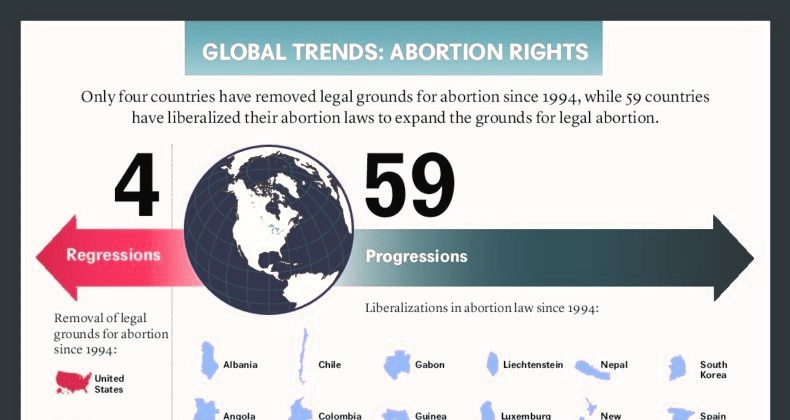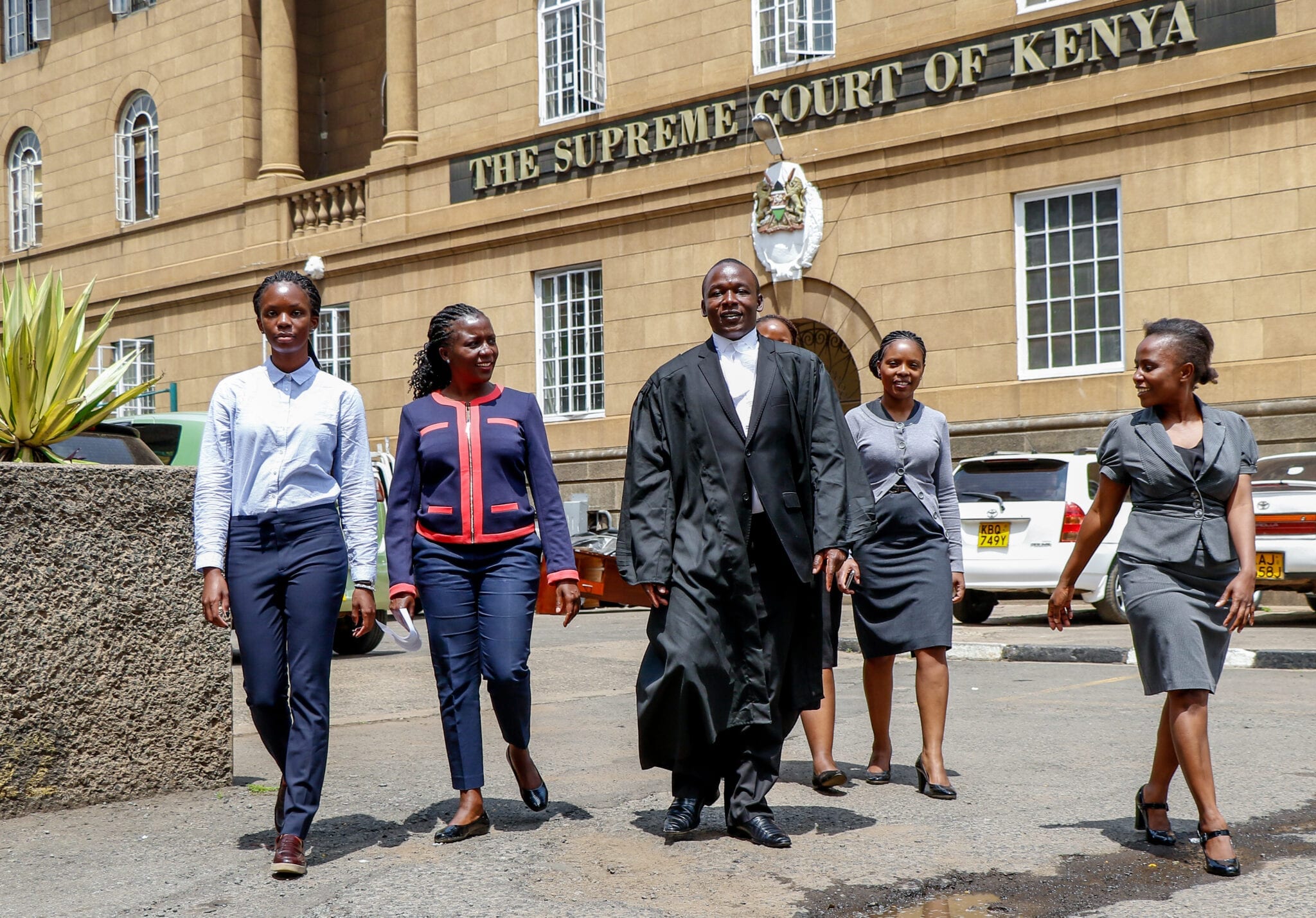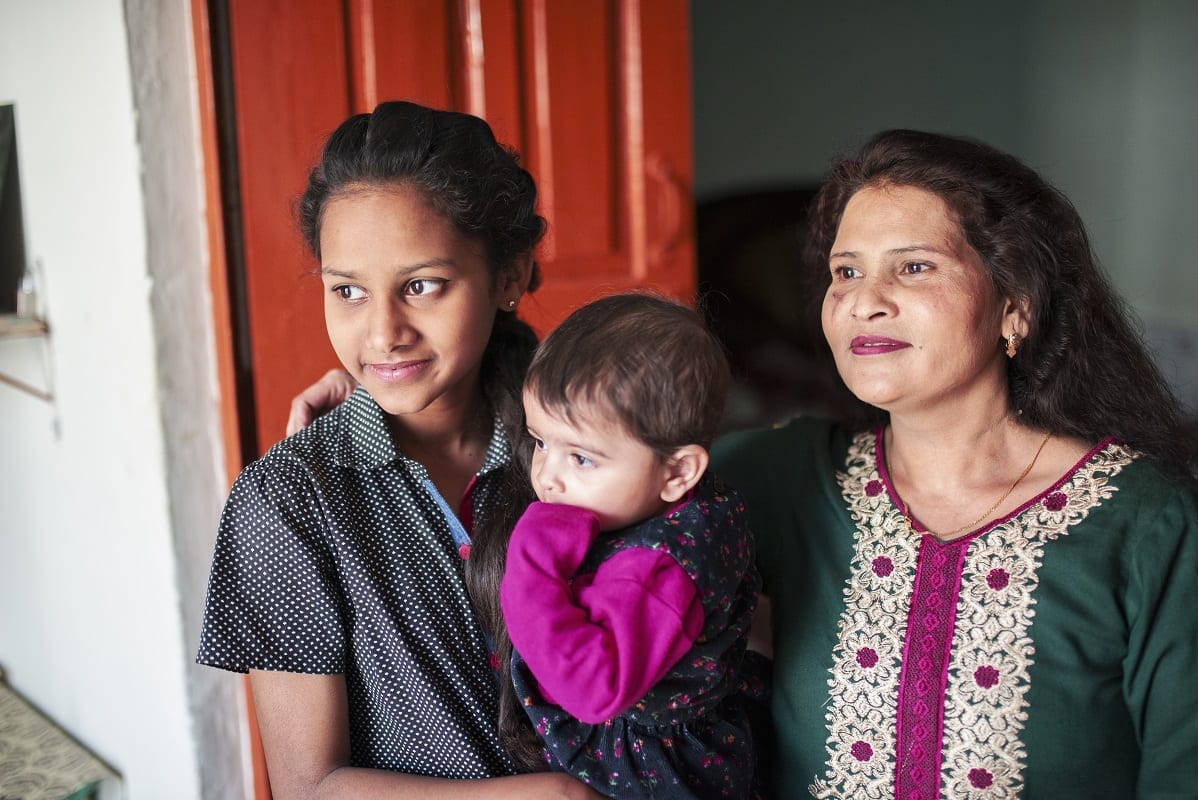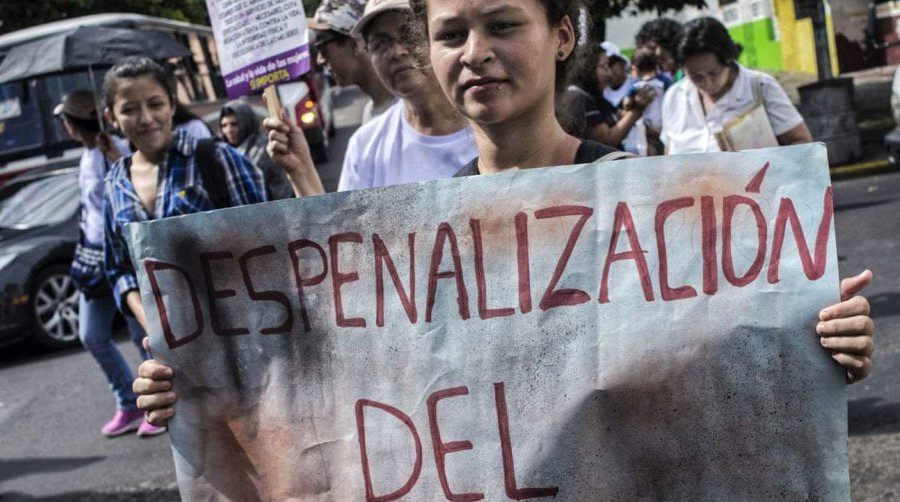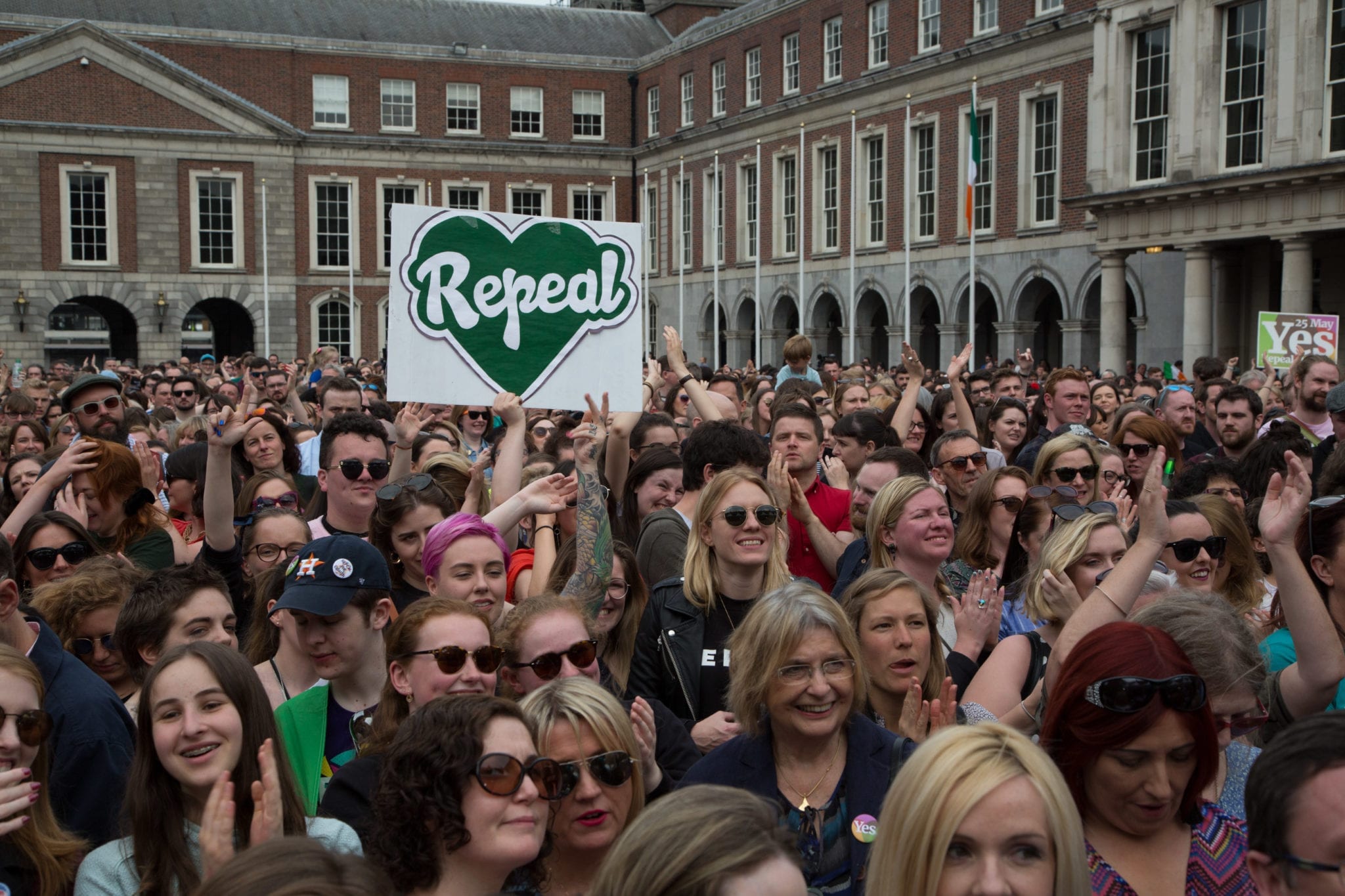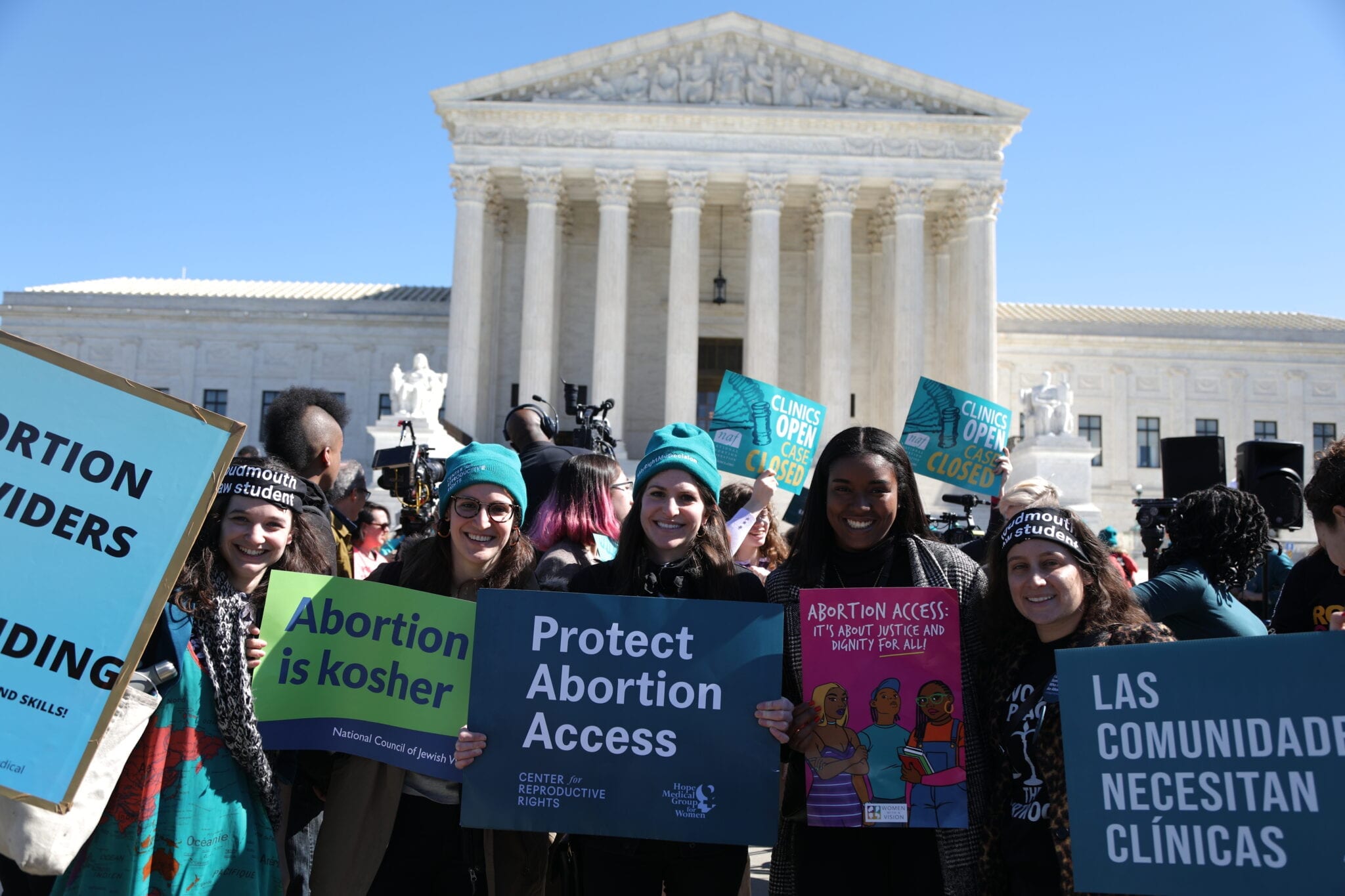2022 Year in Review: Center Achievements Around the Globe
Highlights of the Center's work to build, enforce and defend reproductive rights.
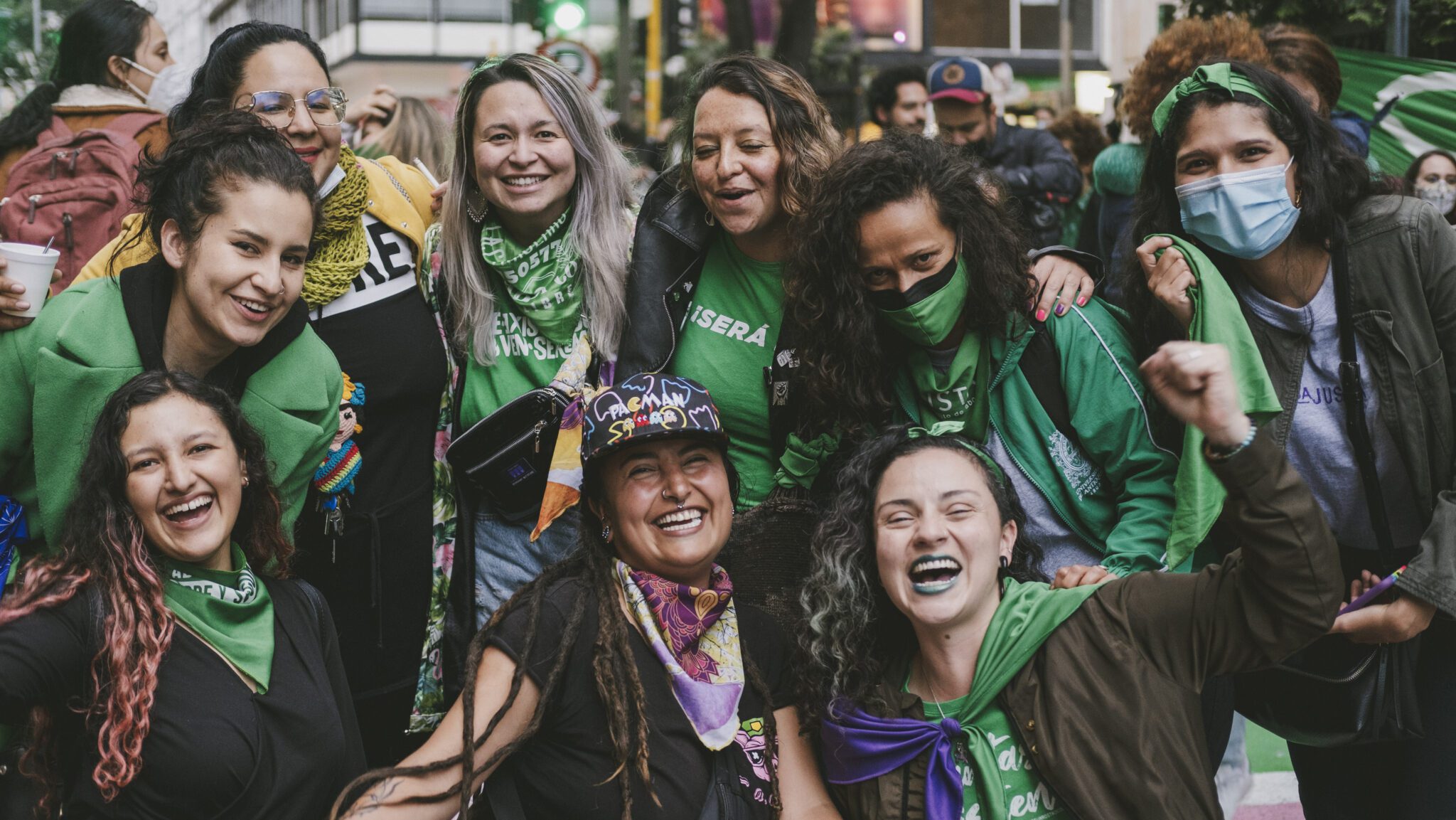
The Center for Reproductive Rights and its local partners made significant progress in building, enforcing and defending reproductive rights around the globe in 2022. While in the U.S. we defended against the most extreme attack on abortion rights in 50 years, our work helped to advance reproductive rights and hold governments accountable for their obligations in countries across five continents.
Here are just a few of the Center’s achievements this past year:
Global
Abortion
Global Trends: Abortion Rights
- For decades, the overwhelming global trend has been towards liberalization of abortion laws and increased access to abortion services. Since 1994, 59 countries across all regions of the world have liberalized their abortion laws to expand the grounds under which abortion is legal. Only four countries have regressed on abortion rights during that time: El Salvador, Nicaragua, Poland—and now, the United States. The Center’s infographic, “Global Trends: Abortion Rights,” shows all the countries that have progressed on abortion rights, and the very few that have regressed. Read more.
Africa
Abortion
Kenyan High Court Affirms the Constitutional Right to Abortion
- Kenya’s 2010 Constitution recognizes health care as a fundamental right—including access to reproductive health care. Years after its enactment, however, the blanket criminalization of abortion continues to exist under an outdated penal code. In a victory for Kenyan women, girls, and health care providers, the High Court of Kenya in Malindi affirmed that abortion care is a fundamental right under the Constitution of Kenya and that arbitrary arrests and prosecution of patients and health care providers are illegal. The ruling came in a case brought by the Center and the Reproductive Health Network Kenya (RHNK) against Kenyan government officials on behalf of an adolescent girl who was arrested for seeking emergency care. Read more.
Adolescent Sexual and Reproductive Health and Rights
African Committee Recommends Tanzania Reform Policies That Barred Pregnant Girls from School
- For years, the Tanzanian government has forced public schoolgirls to undergo pregnancy testing and permanently expelled them if they were pregnant. Now those girls, as well as adolescent mothers, will be able to continue their educations. In a victory for girls across the country, the African Committee of Experts on the Rights and Welfare of the Child (ACERWC) ruled that the practice of expelling pregnant students from school violated adolescent girls’ human rights and recommended that Tanzania reform its education policies. The case was brought by the Center and the Legal and Human Rights Centre of Tanzania (LHRC) in on behalf of six adolescent girls who were expelled from school for being pregnant. Read more.
- With the support of Global Affairs Canada, and in a partnership with CARE Canada, the Center and other organizations implemented a new program in Kenya, Uganda, and Zambia to improve adolescent sexual and reproductive health services and rights. Known as “SHE SOARS”—the Sexual and Reproductive Health and Economic Empowerment, Supporting Out-of-School Adolescent Girls’ Rights and Skills project—the program will directly support over 240,000 adolescent girls, including over 200,000 out-of-school girls. SHE SOARS will fund local women’s rights and youth-led groups, train health providers, and work with government ministries to create sustainable change in the social, economic, and legal environments that impact out-of-school adolescent girls. Read more.
Humanitarian and Transitional Justice Settings
Pilot Program at Uganda Refugee Settlement Improves Delivery of SRHR Services
- In 2019, the Center and CARE International launched a rights-based, community-led pilot program to improve the delivery of sexual and reproductive health and rights (SRHR) services at one of Uganda’s largest refugee settlements. A 2022 report found that the program succeeded in establishing an accountability system for SRHR violations and bringing refugee and host women and girls closer to decisions that impact their lives. Read more.
Asia
Maternal Health
Pakistan’s Sindh Government Increases Access to Obstetric Fistula Repair Services
- Women in the Sindh Province of Pakistan now have access to obstetric fistula repair services in government hospitals, thanks to public interest litigation conceptualized by the Center’s South Asia Reproductive Justice and Accountability Initiative (SARJAI). A dangerous and often-stigmatized condition usually caused by obstructed labor, obstetric fistula is treated via a simple surgical procedure that will be available free of cost in the Sindh Province. The case, Syed & Others v. Sindh, was the first in Pakistan to argue that the widespread incidence of obstetric fistula was a violation of women’s fundamental rights to dignity and life. The Center and its partners are monitoring the implementation of the High Court’s final order issued year-end 2021. Read more.
Adolescent Sexual and Reproductive Health and Rights
Victory for Children’s Rights: Ending Child Marriage in the Philippines
- In a victory for the health, safety and human rights of children, the Philippines has enacted a new law that seeks to prevent and end child marriage. The Center supported the development of the law, which makes child marriage a public offense and adds a series of penalties for violating the law ranging from fines to up to 12 years of imprisonment. “We’re pleased that the government has finally recognized that child marriage is a fundamental human rights violation harming the health and safety of girls and boys,” said Jihan Jacob, the Center’s senior legal adviser for Asia. “This new law represents a significant first step in safeguarding the rights of children in the Philippines.” Read more.
The Philippines Decriminalizes Consensual Adolescent Sexual Activity
- In an important step in recognizing the sexual autonomy of adolescents, the Philippines has amended its penal code to decriminalize adolescent sexual activity that is consensual, non-exploitative, and non-abusive. For years, the Center has been working in the Philippines and other countries to ensure that laws criminalizing age-mate and consensual sexual activity are repealed and that they adhere to international human rights standards. The new law raises the age of sexual consent from 12 years—the lowest age limit in Southeast Asia and among the lowest in the world—to 16 years. It also includes “close-in-age” exceptions that decriminalize sexual activity between adolescents less than three years apart. Read more.
Latin America and the Caribbean
Abortion
Colombia’s Highest Court Rules to Decriminalize Abortion
- The Constitutional Court of Colombia issued a landmark ruling to decriminalize abortion up to 24 weeks of gestation, a move expected to have far-reaching impacts on the exercise of sexual and reproductive health and rights in the country. The decision came in response to a 2020 lawsuit filed by the Causa Justa Movement, of which the Center is a member, that sought to eliminate abortion as a crime, reduce barriers to legal abortion care, and end the risk of criminal prosecution of women and girls seeking abortion care and of health care workers providing care. Colombia is now the eighth country in Latin America and the Caribbean to decriminalize abortion during initial stages of pregnancy, setting an important example of how to advance abortion access in the region. Read more.
Reporting on Rights
Reproductive Violence and the Colombia Truth Commission
- Since 2019, the Center has been working with Colombia’s Truth Commission to support the documentation of reproductive violence during the country’s decades-long armed conflict. In July, the Truth Commission issued a final report that included a chapter on gender-based and reproductive violence, and the experience of women, girls, and LGBTQ+ individuals in the conflict, incorporating information and expertise provided by the Center. The Commission for the Clarification of Truth, Coexistence and Non-Repetition (“Truth Commission”) was established in 2016 to investigate human rights violations during the more than 50 years of armed conflict in Colombia. Read more.
Europe
Humanitarian and Transitional Justice Settings
Joint Initiative Addresses SRHR Needs of Women and Girls Fleeing the War in Ukraine
- The war in Ukraine has forced millions to flee their homes, causing many to face serious barriers to accessing sexual and reproductive health care. The Center and its national partners are undertaking a joint initiative aimed at addressing sexual and reproductive health and rights (SRHR) of women and girls impacted by the war. The initiative is providing support to human rights and SRHR organizations; identifying and addressing barriers in access to sexual and reproductive health care; and sharing findings and recommendations with governments, international bodies, and humanitarian actors to inform their programming and response plans. Read more.
Abortion
- Poland has one of Europe’s most restrictive abortion laws, and a ruling that went into force in early 2021 effectively banned abortion in the country. The Center and its partners have filed third-party submissions to the European Court of Human Rights (ECHR) to intervene in four groups of cases filed by 19 women challenging this highly restrictive law. The interventions provide evidence and analysis drawing on international human rights law, comparative European law, and guidelines from the World Health Organization. Read more.
United States
Abortion
U.S. Supreme Court Takes Away the Constitutional Right to Abortion
- In a devastating decision that will reverberate for generations, the U.S. Supreme Court abandoned its duty to protect fundamental rights and overturned Roe v. Wade, ruling there is no constitutional right to abortion. The decision—which abandons nearly 50 years of precedent—marks the first time in history that the Supreme Court has taken away a fundamental right. While this decision is a devastating setback, at the Center, the work is far from over. Read more.
With its Regression on Abortion Rights, the U.S. is a Global Outlier
- When the U.S. Supreme Court took away the constitutional right to abortion in June, the United States became an outlier to the overwhelming global trend toward liberalization of abortion laws. The Court’s ruling in Dobbs v. Jackson Women’s Health Organization stands in stark contrast to decades of international progress on abortion rights and has left the United States out of step with human rights and global trends. Read more.
Post-Roe State Abortion Ban Litigation
- Without federal protections for abortion access, the Center has filed numerous lawsuits to block state abortion bans from taking effect. The bans—previously unenforceable under Roe —include “pre-Roe” bans that were passed before 1973 but never repealed; “trigger” laws designed to outlaw abortion automatically if the Supreme Court overturned Roe; and recent bans passed in anticipation of the Court’s decision in Dobbs. The Center has also challenged other laws severely restricting abortion, including laws that courts previously struck down as unconstitutional under Roe. Read more.
U.S. House Again Passes Bill to Protect Abortion Rights
- The U.S. House of Representatives voted to pass a bill protecting abortion rights for the second time in less than a year. The vote on the Women’s Health Protection Act (WHPA) came just weeks after the U.S. Supreme Court overturned Roe v. Wade and eliminated the constitutional right to abortion. In the Senate, the bill did not achieve the 60 votes needed to overcome the filibuster. The Center will continue to advocate for this critical law, which would protect the right to abortion nationwide. Read more.
Abortion Rights Measures Win Approval in First Major U.S. Elections Since Roe v. Wade Overturned
- In November 2022, millions of people in the U.S. voted in elections to shape U.S. sexual and reproductive health and rights policy in the wake of the U.S. Supreme Court’s devastating decision to eliminate the constitutional right to abortion. The results made it clear that when people are given the chance to vote directly on the issue of abortion, they overwhelmingly want that right protected. In what President and CEO Nancy Northup called “a seismic win for abortion rights,” voters in three states approved ballot initiatives to protect abortion rights in their state constitutions, while those in two others rejected anti-abortion constitutional amendments. Read more.
Stay updated on the Center’s work to protect and advance reproductive rights in regions across the globe— sign up to receive email updates.
